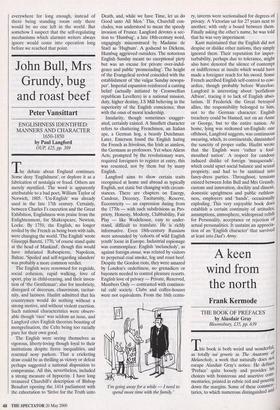John Bull, Mrs Grundy, bug and roast beef
Peter Vansittart
ENGLISHNESS IDENTIFIED: MANNERS AND CHARACTER 1650-1850 by Paul Langford OUP, f25, pp. 389 The debate about England continues. Some deny 'Englishness', or deplore it as a fabrication of nostalgia or fraud. Others are merely mystified. The word is apparently attributable to a bad poet, William Taylor of Norwich, 1805. 'Un-English' was already used in the late 17th century. Certainly, between Charles I's execution and the Great Exhibition, Englishness won praise from the Enlightenment, for Shakespeare, Newton, Locke. By 1750, the English, no longer reviled by the French as being born with tails, were changing the world. 'The English' wrote Giuseppi Baretti, 1770, 'of course stand quite at the head of Mankind', though this would have infuriated Robespierre, Napoleon, Balzac. 'Spoiled and self-regarding islanders' was probably a more common verdict.
The English were renowned for regicide, social cohesion, rapid walking, love of sport, play in child-rearing, and their inven- tion of 'the Gentleman'; also for insobriety, disregard of decorum, chauvinism, tacitur- nity, and laziness. Hazlitt admitted that his countrymen would do nothing without a strong motive, and without violent exertion. Such national characteristics were observ- able though 'race' was seldom an issue, and Langford cites English theorists boasting of mongrelisation, the Celts being too racially pure for their own good.
The English were seeing themselves as vigorous, liberty-loving though loyal to their institutions despite fierce inequalities, and resented nosy parkers. That a cricketing draw could be as thrilling as victory or defeat perhaps suggested a national disposition to compromise. All this, nevertheless, included a strong measure of hypocrisy. I have long treasured Churchill's description of Bishop Beaufort opening the 1414 parliament with the exhortation to 'Strive for the Truth unto Death, and, while we have Time, let us do Good unto All Men.' This, Churchill con- cludes, was understood to mean the speedy invasion of France. Langford devotes a sec- tion to 'Humbug', a late 18th-century word, engagingly misconstrued by Madame de Stael as 'Hugbum'. A godsend to Dickens, Humbug aggrieved outsiders. The notorious English Sunday meant no exceptional piety but was an excuse for private over-indul- gence and public 'promenading'. The height of the Evangelical revival coincided with the establishment of 'the vulgar Sunday newspa- per'. Imperial expansion reinforced a canting belief (actually initiated by Cromwellian republican Levellers) in a national mission, duty, higher destiny, J.S Mill believing in the superiority of the English conscience, thus with the onus of moral leadership.
Insularity, though sometimes exagger- ated, certainly existed. A Smollett character refers to chattering Frenchmen, an Italian ape, a German hog, a beastly Dutchman. Later, Emerson found the English hating the French as frivolous, the Irish as aimless, the Germans as professors. Yet when Aliens Acts, prompted by the revolutionary wars, required foreigners to register at entry, this was resented, not by them but by many English.
Langford aims to show certain traits recognised at home and abroad as typically English, not static but changing with circum- stances. There are chapters on Energy, Candour, Decency, Taciturnity, Reserve, Eccentricity — an expression dating from the 1770s — with such subdivisions as Pro- priety, Honesty, Modesty, Clubbability, Fair Play — like Wodehouse, easy to under- stand, difficult to translate. He is richly informative. Even 18th-century Russians were astounded by 'cohorts of wild English youth' loose in Europe. Industrial espionage was commonplace. English `melancholy', as against foreign ennui, was related by visitors to perpetual coal smoke, fog and roast beef. Despite the Gordon riots, they were amazed by London's orderliness, no grenadiers or bayonets needed to control pleasure resorts. English love of privacy — Private, Reserved, Members Only — contrasted with continen- tal café society. Clubs and coffee-houses were not equivalents. From the 16th centu- `I'm going away for a while — I need to spend more time with the family.' ry, taverns were sectionalised for degrees of privacy. A Victorian sat for 27 years next to another, with only a board between them. Finally asking the other's name, he was told that he was very impertinent.
Kant maintained that the English did not despise or dislike other nations, they simply ignored them. Their reputation for imper- turbability, perhaps due to tolerance, might also have denoted the silence of contempt or indifference at insults which would have made a foreigner reach for his sword. Some French ascribed English self-control to cow- ardice, though probably before Waterloo. Langford is interesting about 'perfidious Albion', tracing it to lack of English abso- lutism. If Frederick the Great betrayed allies, the responsibility belonged to him, not to the German character. English treachery could be blamed, not on an Anne or George, but to the entire nation. At home, lying was reckoned un-English: one offshoot, Langford suggests, was continuous swearing, which, to continentals, diminished the sanctity of proper oaths. Hazlitt wrote that the English were 'rather a foul- mouthed nation'. A respect for candour induced dislike of foreign 'masquerade', which could upset social balance and sexual propriety, and had to be sanitised into fancy-dress parties. Throughout, tensions existed between John Bull and Mrs Grundy, custom and innovation, docility and dissent, domestic uprightness and public ruthless- ness, employers and 'hands', occasionally exploding. This very enjoyable book does establish a certain continuity of attitudes, assumptions, atmosphere, widespread relish for Personality, acceptance or rejection of actual personalities. It sustains an apprecia- tion of an 'English character' that survived at least into Dad's Army.









































































 Previous page
Previous page